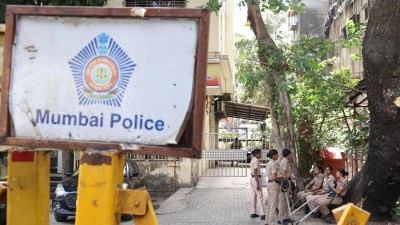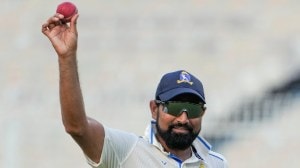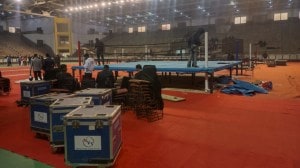Burying old mindsets
If Gujarat is India's most globalised state and the earthquake our firstpost-globalisation disaster, is it any surprise that the impact ha...

If Gujarat is India8217;s most globalised state and the earthquake our firstpost-globalisation disaster, is it any surprise that the impact has even beenfelt at The Leela, the five-star hotel at Mumbai8217;s Chhatrapati ShivajiInternational Airport. No, the hotel has not been deserted. It is filled tocapacity, what with NRI relatives of the quake victims making overnightstops on the way to their home state. They are coming in not merely withconcern and sympathy but also money and the promise of more. One reason theinternational community has been so forthcoming with help is indeed thepreeminent status the Gujjus enjoy within the Indian diaspora.
That Gujarat is no Orissa shows not only in the NRI involvement and contribution but also in the very different manner in which the world media is covering the quake. You no longer have the same old stories of a Third World disaster. There is a very different kind of empathy this time. Rail crashes, ferryboat disasters, plagues and even cyclones and floods are easier to dismiss as typical Third World problems. After all, even floods and cyclones give you warnings and better governed nations are able to move people to safety. An earthquake, on the other hand, has that humbling quality.
What can a people do, as The New York Times pointed out in a marvelouslytouching editorial, when they lose faith in the firmness of the earth? Someof the richest and the most powerful countries in the world, the US andJapan in particular, have known the power of a genuine quake from close andnobody doubts that a subterranean twister of this intensity would havecaused plenty of damage even in Osaka or Orange County. A quake, therefore,is not seen as a typical third world disaster, man-made or preventible. Andwhen it happens in a state that has not merely India8217;s finest infrastructure,physical and human, when the collapsed structures are multistorey concreteblocks and not merely thatched huts, when relief websites are sprouting bythe dozen, the world views it entirely differently. Amazing, isn8217;t it, how alittle bit of prosperity converts pity into sympathy? Nobody is saying whatelse could you expect from these bungling Indians. They say, instead, whatcan anybody do about an earthquake of this scale? Incidentally, 7.9 is the widely accepted Richter rating on the quake the world over. Wonder for whatmetaphysical reason are our sarkari scientists still sticking to 6.9?
THAT is why, sitting smugly and safely away from the disaster zone, ina Manhattan hotel, it is possible to look at this quake as some kind of aglobal calamity rather than another of those disasters on our easternseaboard. Surely, in the newspapers and on television screens there arestories of mismanaged relief, of foreign rescue teams not knowing where togo and of people8217;s anger. But there are no hungry, begging faces, no mentionof hunger and starvation. There is even some awe, particularly in the Germanpress, over the quality of roads and telephones in Gujarat. Here is a scarythought. What if, in some macabre irony, this exposure to a ravaged Gujaratpersuades the hordes of these ambulance-chasing international hacks on thedisaster beat to somehow come back with the impression that this is the wayeven the rest of India looks. They will be in for a nasty shock the nexttime 8212; God forbid 8212; they go to cover a calamity in coastal Orissa. Or evenAndhra Pradesh.
In the past we steadfastly refused to accept foreign aid and relief in our calamities. Even charitable relief was supposed to be channelled through official agencies. Now the Danes and the Norwegians and the Germans and so on can land straight at Ahmedabad and walk straight out looking for survivors to rescue much in the anyone-here-been-buried-and-needs-help manner.
Planes with relief supplies from Pakistan and Israel are parked close atthe same airport and their crews even give on-the-spot TV interviews. Teamsfrom more than a dozen countries, with state-of-the-art technologies, arealready present in Gujarat. The government, instead of trying to control,restrict or even regulate these activities, has actually asked its missionsto ease up on visas and generally give up the old cussedness. The favouriteGujarat story of the European newspapers, understandably, is about their ownrescue teams. Two questions arise. Could this have happened even a coupleof years ago? Could it have happened if the calamity, though still inGujarat, was the plague instead of a quake?
One reason we are much less hesitant of accepting foreign help this timecould be a simple one. A quake is not a national embarrassment like theplague, or even a drought. So you do not tend to get defensive the moment anoutsider expresses sympathy. But equally significantly, the reason why we are a lot less suspicious of foreign help now than in the past is obviously our rapidly globalising mind. A more confident, solid, even if poor nation is less paranoid of the foreign hand. Surely, there was suspicion when the Chinese offered to send their seismic experts as there would have been if theAmericans sent a planeload of microbiologists to pick the plague samples.But, overall, our ready acceptance of foreign help shows a rapidlymodernising mindset that does not view the rest of the world in necessarilyhostile terms.
IT is difficult to pinpoint exactly when this change came about and why and how but you could safely say that one reason is simply the success of the Indians abroad. It has given the rest of us a new assurance. It has persuaded the West to speak of us in less condescending terms. If thepopulation of ethnic Indians is touching 1.7 million in the US, with a perhousehold income about 50 per cent in excess of the American mainstream, andif the richest amongst them happen to be Gujaratis, it does change thepsychological equation a bit.
But another turning point, let me suggest, was Kargil. The classical Indiansuspicions of the West are rooted in our history of strategic insecurities.We look at it this way: The Chinese attacked us so unabashedly and yet theworld went out and embraced them. The Pakistanis have been trying to wrestKashmir from us and the entire West seems to side with them and has confirmed that view with its voting record on the UN Kashmir resolutions.Those who asked how a society with such a rich diaspora and whose elites did all their business in English could be so wary of the world, missed the point that Indian xenophobia was always more strategic than cultural.
And then Kargil happened. When a nation, after decades of strategic isolation, suddenly finds the world on its side in such a grave moment ofcrisis it is bound to leave a lasting impact on its mind. The US, the P-5, the Saudis and the Iranians 8212; all the old rogues 8212; had seemed to be such friendly powers during the Kargil war that it is now not so easy to view them all with the old suspicions again. At least not without any provocation.
Our economy, therefore, may still be a long way from genuine globalisation,our PSUs may still be under the thumb of the redoubtable joint secretary inthe Government of India, ministry of this or that, but politically andphilosophically we are more willing to reach out to the world than ever inthe past. If our minds are opening up faster than our economy, it is achange for the better and we need to celebrate this even if it has takenthe Gujarat quake to underline it for us.
Postscript: The very old German lady sitting next to me on the flight knocked down Dom Perignon faster than I swallowed my Evian, hoping it wouldwork as a good antidote to jet lag. She was reading the popular magazine Bunte, with rap singer Sabrina Setlur on the cover. A bit much to celebrate her liaison with Boris Becker as yet another NRI success story but she is surely making more covers than Sabeer Bhatia or Kanwal Rekhi ever will.
8220;Beautiful girl, from your country. But what8217;s wrong with her? Why is shegoing with Becker. He has nothing up there,8221; the German lady said, tappingher head gently with her champagne glass. 8220;And where is she from? Gujarat?Are you also from Gujarat?8221;
In New York, the devout Gujaratis have something else to worry about. Thefamous city magazine Timeout has Lord Vishnu on its cover but the captiondescribes Him as 8220;Lakshmi, Goddess of Wealth8221;. The Gujjus, as usual, havebeen in the forefront of the protest. But the editor found an escape whensome callers confused the God on the cover with Krishna instead of Vishnu.You have so many gods, the editor said, that even you get confused. So whyblame us if we mixed them?
One reason the international community has been so forthcoming with help is the status Gujaratis enjoy within the Indian diaspora.
Those who asked how a society with such a rich diaspora could be so wary of the world, missed the point that Indian xenophobia was more strategic than cultural
- 01
- 02
- 03
- 04
- 05






























